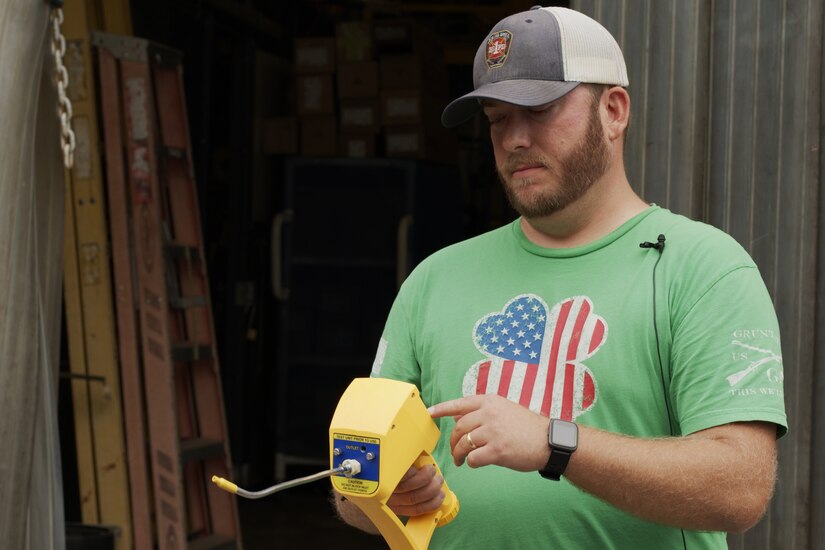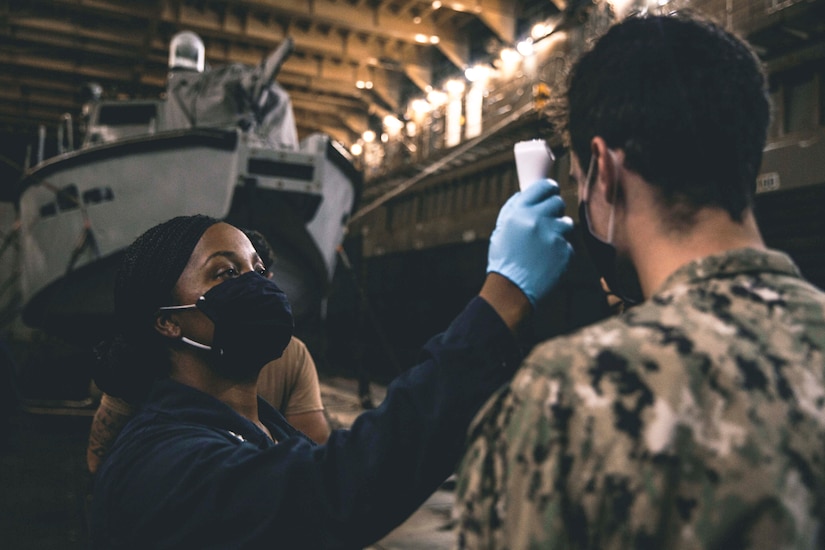Oct. 20, 2020 |
In April, nearly the entire Marine Corps Systems Command workforce began teleworking full-time as the COVID-19 pandemic spread.

During this time, the command's AC/S G4 department — which includes facilities, services and supply — continued on-site work with a primary mission at hand: purchase supplies, disinfect the premises and prepare the workforce for a safe return.
"All of G4 was involved during this process," Dean Kleveno, deputy AC/S G4, said. "During the COVID-19 pandemic, [the supply section] didn't close up shop. The facilities [office] was here the whole time. The warehouse was also still open. It was a complete team effort."
In March, the World Health Organization declared COVID-19 a pandemic. By the end of the month, the Virginia Department of Health reported more than 134,000 positive cases throughout the state. Around this time, G4 began the challenge of preparing to keep the pandemic from spreading to its workforce.
The department started researching necessary items to prevent the spread of COVID-19 germs within MCSC. They purchased, in bulk, masks and disinfectant wipes to disperse to employees as needed. They also bought more than 1,000 gallons of hand sanitizer and distributed them throughout MCSC buildings on Hospital Point and in Stafford, Virginia.
"Our department is responsible for all things involving emergency management," Anthony Parker, the MCSC's facilities manager, said. "Part of the job is to ensure the workplace is safe for our employees, so we're doing everything we can to protect them from the spread of COVID-19."
According to the Centers for Disease Control and Prevention, the coronavirus can be spread by touch in public areas such as bathrooms. Upon learning this, Parker's team acquired and began installing new, touchless toilets and faucets in bathrooms throughout MCSC facilities on Hospital Point.
Additionally, G4's Services branch worked with Naval Facilities Engineering Command Washington and Washington Headquarters Services to coordinate the preventative cleaning and installation of touchless soap dispenser, faucets and toilet fixtures at all leased MCSC facilities in Stafford, Virginia.
Chris Cooper, the facilities supervisor at MCSC, said the touchless appliances will reduce the workforce's and visitors' risk for contracting the virus, which benefits the entire command.
"Touchless fixtures not only minimize the risk of contracting COVID, but also keep people from having to use fixtures that thousands of people touch every week," Cooper said. "It also allows the command to mitigate the risk further than the previous status quo, which falls in line with the commander's direction on ensuring we are taking care of our people."
Cooper and the team brainstormed solutions in the event a person who unknowingly carries the virus enters the building. The CDC states that U.S. facilities typically close for at least 24 hours after disinfecting an area occupied by someone with COVID-19. In some cases, the areas are closed off for several days or as long as a week.
In June, the facilities department acquired multiple "fogger" machines designed to eliminate COVID-19 germs from an area within hours. Approved by the Environmental Protection Agency, the machine allows employees to return to their workspaces within hours rather than having to wait several days.
With the push of a button, the machine pulls a health care-grade, all-purpose disinfectant through a pump and converts the substance into a hydrogen peroxide-based mist that destroys bacteria and viruses related to COVID-19, swine flu, and other infectious diseases.
"It gets ultimate penetration in a room, in every nook and cranny that sprays and wipes cannot reach," Cooper said.
If a room is larger in size, multiple machines are deployed, as necessary. The system delivers complete surface disinfection throughout a room, delivering a precise amount of disinfectant to treat every exposed surface.

"We are constantly developing solutions to [resolve] ongoing issues involving every aspect of MARCORSYSCOM workspaces and employee well-being," Cooper said.
Preparing the workforce for its return to campus wasn't easy. G4 encountered challenges, especially when the pandemic began spreading in the United States last spring. For example, hand sanitizers and disinfectant wipes were difficult to purchase, as they were in high demand and short supply nationwide.
"We had to do a lot of market research," Kleveno said. "We were traveling to get the products we needed and finding ways to disinfect facilities. Ultimately, we got the job done."
Kleveno called March and April "a hectic time," as COVID began to spread and G4 were trying to find solutions to problems the pandemic presented to the command. He said the department is ready to cleanse the premises whenever needed, and will continue to answer the call whenever the requirements come in.
"I want the workforce to know we've supported the command as expeditiously as possible," Kleveno said. "We answered the call during a stressful, urgent period, and we're prepared to support them right now."








No comments:
Post a Comment